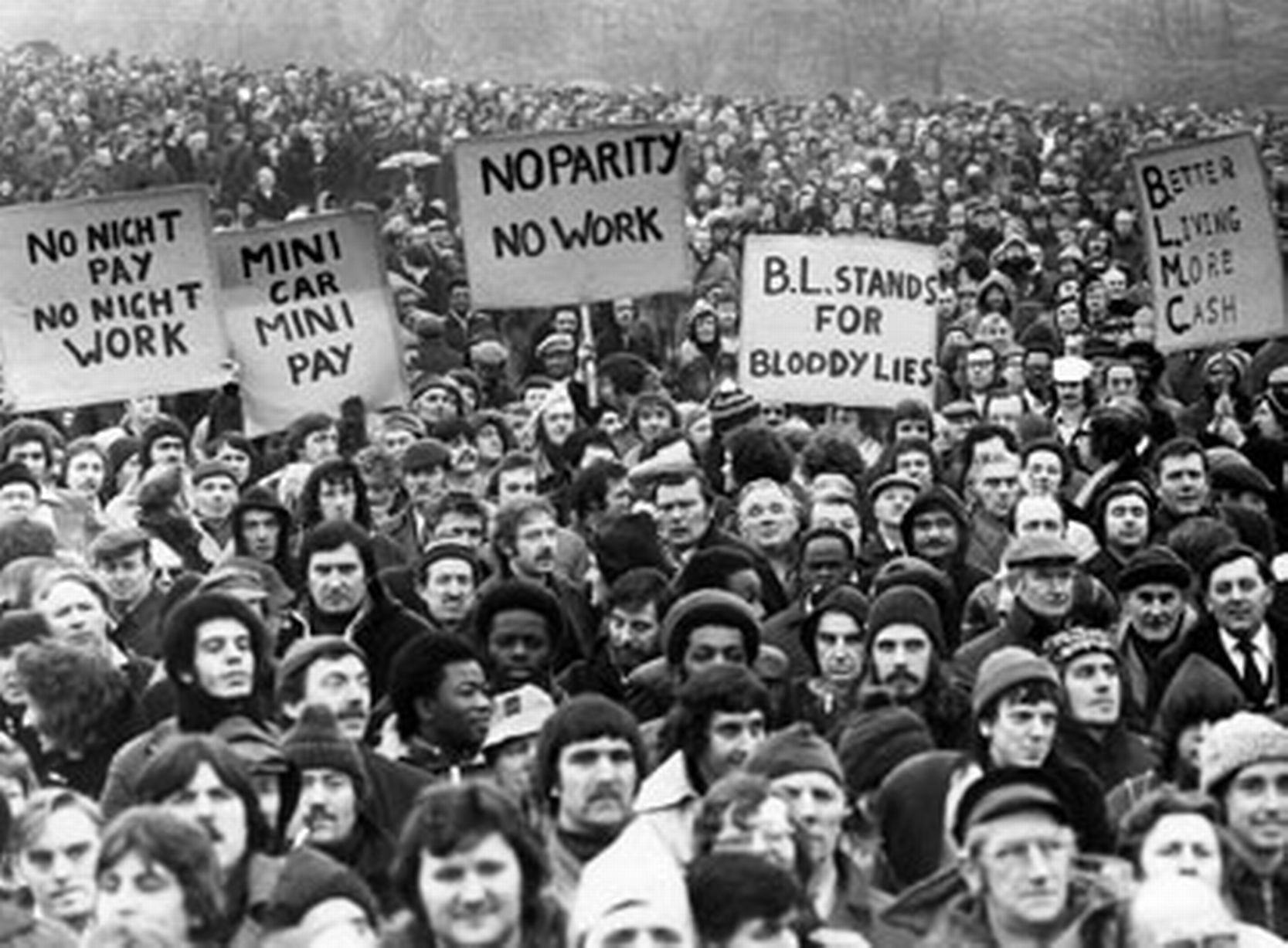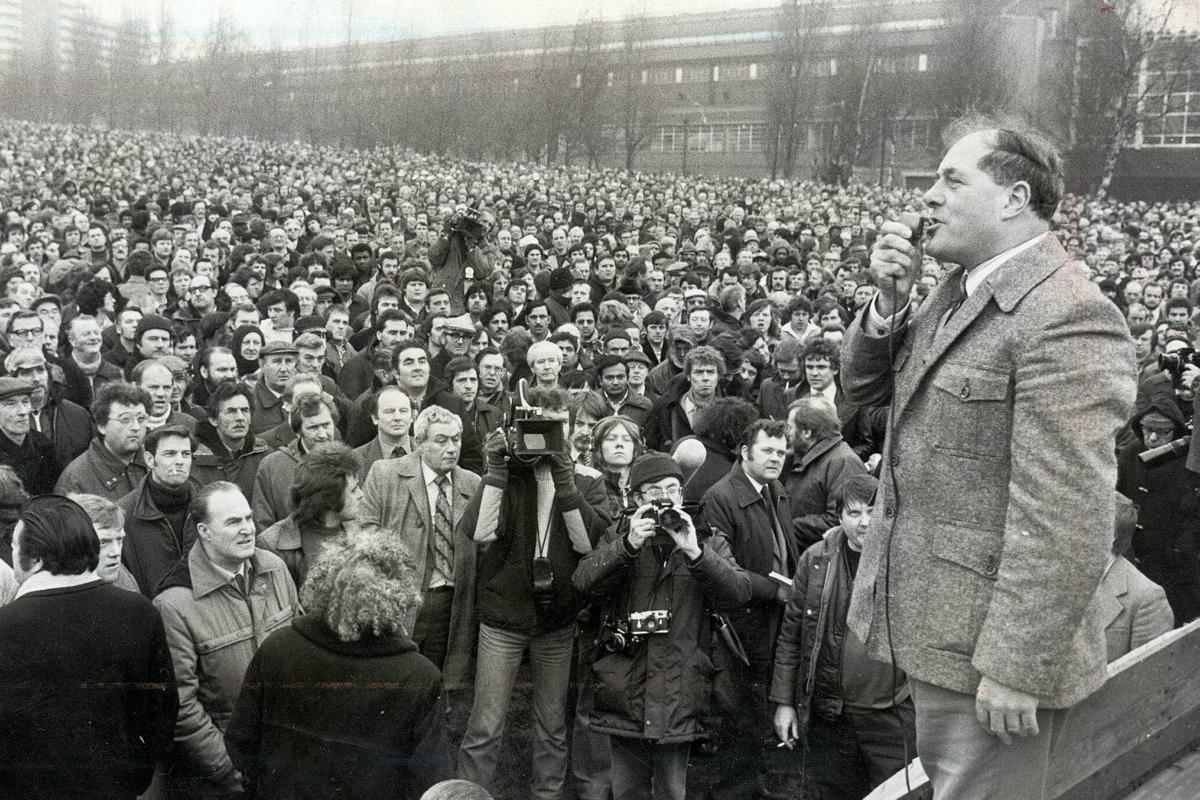The death last month of car worker and trade unionist Derek Robinson, aged 90, has revived many memories of the factory workplace struggles of the 1970s. Steve Jones looks back at the life of union militant, “Red Robbo”, and the lessons for today in fighting back against the bosses.
The death last month of trade unionist Derek Robinson, aged 90, has revived many memories of the factory workplace struggles of the 1970s. As convenor from 1975 at the British Leyland (BL) Longbridge car plant in Birmingham, Robinson became one of the most high profile trade union militants of the period, earning the nickname “Red Robbo”, with Margaret Thatcher calling him a “notorious agitator.”
Robinson started working in the Austin plant at Longbridge during the 1940s, becoming active in the trade union movement. Becoming convenor at Longbridge in 1975, he quickly started work linking the union forces at the various BL car plants together, using the Shop Stewards Combine Committee that he chaired to prepare for the struggles that were to come.
Power in the union
The car industry in the post-war period was one of the most heavily union-organised sectors of British industry, with shop stewards committees established at factory level and linked together to give the rank-and-file members real power in standing up to management. As such, the unions had considerable say over what went on with regards to pay, conditions, overtime and so on.
Management hated this, of course, but given the huge profits being generated, with car ownership rising sharply, they were prepared to go along with it. They were also acutely aware that the union officials would act as a break on any wildcat action that might take place.
As with the rest of British industry, however, the profit figures were hiding a dismal failure by the owners to invest. Aging factories and aging machines became the norm. Productivity and costs per unit soon started to lag behind other countries. Cheaper and better cars flooding in from abroad began to eat into the British market.
One of the most visible victims of this decline was British Leyland, formed in 1968 out of a merger of several smaller companies. Although now a major player in the UK car industry, with a number of well-known names under its belt, such as Austin, Land Rover and the Mini, the company soon started experiencing financial problems. The years of under-investment now started to have a dire effect.
In 1975, it was agreed that the only way to save the company from going under was partial nationalisation, under the direction of the National Enterprise Board, an investment body established by the Wilson Labour government.
As a member of the Communist Party, Robinson backed both the form of nationalisation and the “reforms” that management now wanted to bring in, including a restructuring of the pay system, and he promoted the illusion of “partnership” between unions and management. He felt that a nationalised car industry could be a success on this basis and that the “partnership” represented a step towards workers’ control, which was far from being the case.
It soon became apparent, however, that BL management had no solution at all to the company’s problems other than to cut costs; in other words, to introduce lay-offs. Shop stewards at BL increasingly had to take strike action almost on a daily basis at one plant or another to ward off this or that attack from the bosses. The bosses liked to present this as being all the fault of Robinson alone, whereas in fact it reflected a general militancy throughout the industry.
As such, along with other militant sectors of the union movement like the miners and rail workers, the BL workers soon became a national symbol of union power and therefore subject to constant attack. Robinson, as convenor for the union at the Longbridge plant, became a particular target for the national newspapers and the Tory party, always referring to him as “Red Robbo”.
Bosses’ offensive
 In 1977, BL appointed Michael Edwardes as its CEO. A flashily-dressed “wide boy” who was typical of the type being promoted by industry boards, he soon presented his real credentials – cut, cut and cut again. 15,000 jobs in BL were to go for starters, with the Liverpool plant being closed completely.
In 1977, BL appointed Michael Edwardes as its CEO. A flashily-dressed “wide boy” who was typical of the type being promoted by industry boards, he soon presented his real credentials – cut, cut and cut again. 15,000 jobs in BL were to go for starters, with the Liverpool plant being closed completely.
The right-wing trade union officials, who dominated the AUEW (now part of Unite) at a national and regional level at that time, pushed through acceptance by the union reps of the losses. However, Robinson sought to bypass the officials, mobilising the rank-and-file directly, using the shop stewards movement. Strikes at Longbridge increased as workers sought to defend what had been won over the years.
The message that trade union militancy was now the only way to fight back did go down well with the establishment. MI5 was drafted in to dig up dirt on Robinson and report to the government on militant trade unionists. Edwardes knew that the union would have to be pushed back and the power of the shop stewards broken if he was to get all his brutal “reforms” through.
In 1979, a Tory government was elected and they gave Edwardes the green light to act. They understood that defeating the shop stewards movement in Longbridge and the rest of BL would be just the first step in a war to defeat the unions across the whole of British industry, with the miners as their ultimate target.
Edwardes presented a plan to shut 15 BL plants in return for £500 million in new government funding. When the BL convenors produced a pamphlet attacking the plan, with Robinson’s name on it, Edwardes moved and sacked Robinson, using this as the excuse. Management and the Tory press begun a huge propaganda campaign to tell the workers: if you back “Red Robbo” your jobs are gone.
The right-wing trade union officials in the AUEW also maneuvered to isolate Robinson, they just wanted a return to nice cosy deals with the bosses and the end of militancy. In a factory vote, the Longbridge workers – under huge pressure – voted against taking action to defend Robinson. He was effectively blacklisted inside the car industry and never worked in it again.
The Longbridge vote did not save the workers jobs either. BL continued its “managed decline” and in 1986 the remnants were renamed as the Rover Group. By April 2005 the company had gone bust with its few remaining profitable sectors being absorbed by other companies.
Militant lessons
The announcement of the death of Derek Robinson was rightly marked by warm words from the likes of Len McCluskey, but also by a torrent of abuse from the Tory press. Even nearly forty years later, the bosses still fear his example of militancy in fighting against the attacks and false promises of the bosses and their friends in government.
As in the 1970s, the bosses today have nothing to offer but “reforms” and “modernisation,” which in reality mean job losses, longer work shifts and pay freezes or even cuts, all to boost profits at the workers’ expense.
A layer of union officials still think that the road of struggle, represented by people like Robinson, is not the way to proceed. They see unions as passive organisations, acting as factory lawyers and single-issue campaigners rather than what they should be: militant forces of the organised working class.
The task before union activists today is to learn from the defeats of the past and create a new layer of militants ready to fight both the bosses and their system. This must of necessity involve both an industrial and political struggle, fighting against capitalism – but also for a socialist society.






